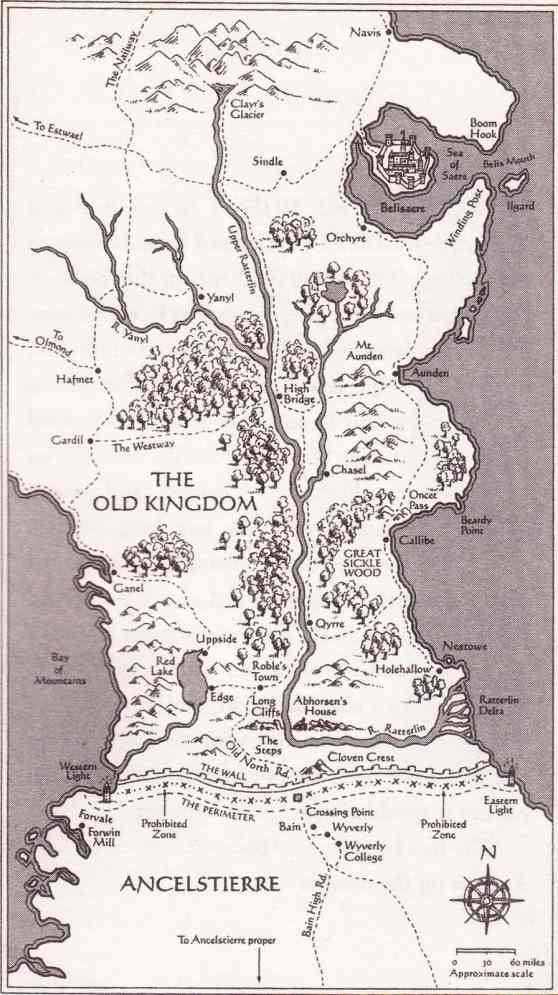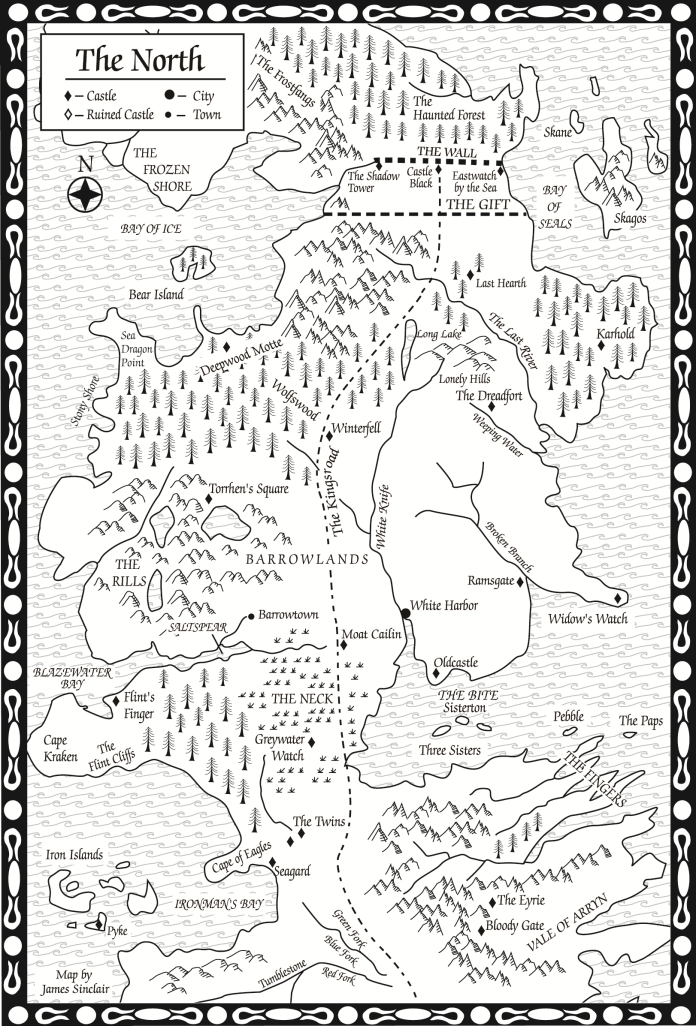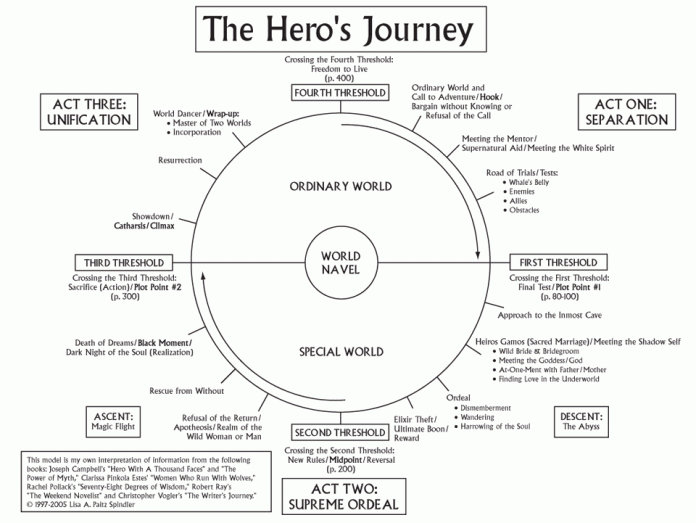Sabriel is a 1995 fantasy novel by Garth Nix. It is the first in the Old Kingdom trilogy. It won the Aurealis Award for best young-adult novel and best fantasy novel, as well as being an ALA Notable Book and a short-list nominee for the 1996 Ditmar Award. Regardless, I had a horrible time getting into this book. So bad, in fact, that I am still working on it.
Before the negativity begins, I will say there were a few things that I did really enjoy about the book. I love that it features a strong female character who displays compassion and intelligence. The world is well developed — there’s a map at the front (who doesn’t love a good map?). The characters are interesting. I know a fantasy fan would find a lot more to love about this story. But that’s about as far as I get.
A lot of the book left me bewildered. Why is time marked by Western calendar years — are we actually in the 1600s? Why does the map in the front of the book look like an inversion of Game of Thrones? For some reason, it’s acceptable for girls to travel alone, but they still have to go to finishing school. What kind of bizarre gender norms makes that possible? What is a Charter Mage? Why is there no glossary at the back of the book? Where is Gandalf to explain the parameters of this mission and give us some historical context?
I’ve been carrying the book around for the last week or so and was approached by a very enthusiastic fan that loved the series. I admitted that I was struggling to enjoy it. It’s the magic, I complained. There’s no clear transition between magic and reality, and I don’t understand the rules of the magic. The fan (to her credit) thoughtfully considered before answering. She suggested that since she’d been younger when she first read the series, perhaps it was easier for her (and other readers who love the series) to accept the magic and worry less about the technical details. While I’m sure it’s more than that, I think that’s a valid point.
I know there’s a lot that appeals to a lot of people about fantasy, and just because I struggled with this book doesn’t mean I wouldn’t recommend it. Garth Nix is well loved and this particular series is critically acclaimed, meaning that I’d definitely feel comfortable giving it as a recommendation. Reading the book, I have learned, can be about more than just enjoying the story. I now have a better understanding of the book’s reading level and the intended audience. At the very least, I have a good grasp on elements of the story that might appeal to other readers.
Why is it that every fantasy book just feels like a rip off of Lord of the Rings? Is it because they all follow Joseph Campbell’s monomyth (the hero’s journey)? Or is that the point? For a certain fan base, it is that this story simply never gets old? Or maybe it’s just me – maybe I am the factor that has gotten too old, too analytical, and too cynical.




I like that you admit that it’s your own opinion on things that makes you find negatives in the book, or so it seems to me. As for your list of questions between the maps, a few things to point out. Who says their years are done by the western calendar? Being a fantasy world, they can use whatever calendar system they want, though using one similar to ours can make it easier for the reader.
The map of the old kingdom is similar to westeros, as much as it is similar to just italy. A long narrow land, and with the old kingdom, unknown what is both north and south of the map.
In Ancelstier, it isn’t acceptable for women to travel alone, which is why the scout was wary of letting Sabriel pass the wall unescorted. In the south, the land is similar to our industrial revolution erra, but north of the wall, more medieval, with an underlying magic.
Charter mages are explained more in the following books, but a little mystery is welcomed, as well as how there is a good, ordered, magic, and the bad, chaotic, magic. Not to mention the idea that a necromancer must travel in death to return a soul to life, and how the gates are, is a fantastic way of things. Anyways, a charter mage seems simply, a mage who has been taught how to use the charter, which could be akin to the force, but must be woven together through charter marks to cast spells, like light source, a barrier against arrows, etc. There is a lot more known about the magic in this book, than that of Lord of the Rings, or other books that deal with magic.
And we are reading the book following Sabriel, she doesn’t know as much of the old kingdom, or what she is doing that someone from south of the wall. That, and the added bonus of her “cat” not being very helpful is a pleasant change from books and movies that spell out everything to the audience. You loose a lot of wonder when you get spoon fed the mission, how it is meant to happen, why things are the way they are. Learning as the character learns, bit by bit allows you to put yourself in the place of the character.
An added thing, I like how Garth Nix has written the characters Sabriel, and Lirael. They aren’t just some strong woman, they are complex, both strong and weak, and everything in between. Unlike a lot of other books, whos women are either strong, or weak, but never both. It has made it far more enjoyable to read.
Thanks for this comment. It’s great to see that you are so passionate about the book — it really makes me feel like it’s worth giving the book another go! Your point about the calendar system is great, as is your point about complex female characters. I’d be happy to admit my first impressions were wrong — if I can find some free time to do some reading for pleasure.
I absolutely adore this book.
But one thing I want to point out is that you seem to be saying, HEY! Garth took George’s map and inverted it. Now this may not be what you’re saying, but that’s the way it looks.
So I went to do a little research. George started writing his book in 1991 but it was NOT published until 1996, where as Sabriel was published 1995.
That being said, I don’t think anybody ripped anything.
I know when I read about the Charter Mages, I didn’t quite get it either, but reading on later I believe they made more sense to me.
This was the book that ignited my passion for reading or later on writing.
I’m an aspiring writer, and I owe some of that to Mr. Nix. But this book also helped me realize that people could hurt me with their words if I couldn’t hear it. He drew me into is world so I could get away from the horribleness of mine. And that’s what I intend to do with my writing.
Keep reading, it’s awesome.
The concept of the Old Kingdom essentially lies in an idea of an alternate Universe. It’s sort of like saying, imagine this is Europe, but in this Europe there’s a regular world that’s in about the 1930’s, but there’s also a weird walled in part of the land where magic exists. They are not in a medieval time period, in the world where there is magic it’s like an element. It’s presence around everything means it is corrosive to the modern manufactured objects from the regular world. So when you cross the wall into the old kingdom, you can’t bring modern non-handmade goods, they fall apart. For practice getting into the mindset of being in an alternate version of our world, I’d say the Golden Compass is very similar or any of Jasper Fforde’s books where you are in alternate versions of England. Even the Lion the With and the Wardrobe does this… like how is that Beaver’s have tea?? We don’t really need to question it. The author tries to make the world familiar enough that we can relate to it, but weird and other in different ways.